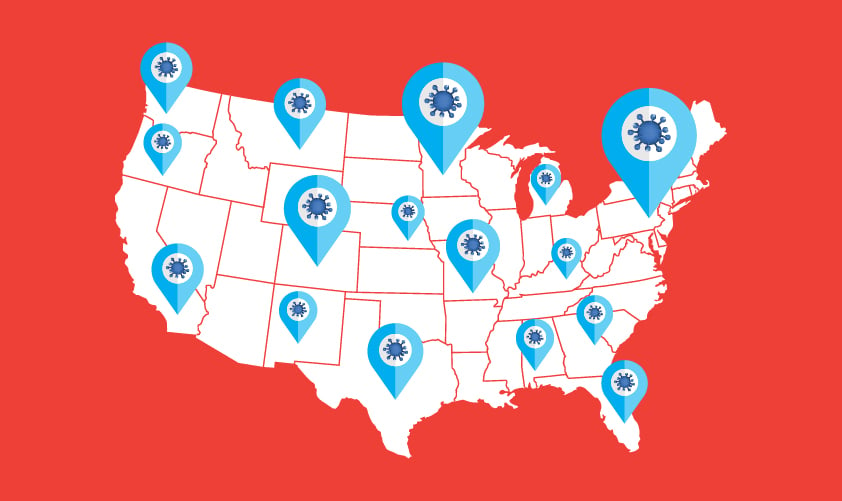
ITEP's Research Priorities
MedPage Today: Tenet Gets Big Federal $$$ but Still Cuts Employees
July 9, 2020
Many companies, including Tenet, delayed paying their 2017 tax liabilities at the rate then (35%) to follow whatever the rate is when they decide to pay (21% for 2019), said Matthew Gardner, a senior fellow with the Institute on Taxation and Economic Policy. “That’s certainly an incentive created by the tax cut,” Gardner told MedPage […]
Gothamist: Undocumented Immigrants In Need Finally Get Promised Pandemic Cash Assistance
July 9, 2020
Most workers who lost their jobs during the COVID-19 pandemic started receiving unemployment and federal stimulus checks in March and April. But undocumented immigrants don’t qualify, even though the Institute on Taxation and Economic Policy found more than half pay taxes (including over $1 billion in New York alone). U.S. citizens married to undocumented immigrants […]
Congressional Budget Office Confirms That IRS Budget Cuts Lose Money and Benefit the Rich
July 9, 2020 • By Steve Wamhoff

Lawmakers often claim that they are “saving” taxpayers money by slashing federal spending, but the truth is that these cuts often are counterproductive and costly in the long-term. One type of budget-cutting has costs that are immediate and obvious—cuts to the IRS, the agency that collects the revenue that pays for federal spending. A new report from the Congressional Budget Office (CBO) confirms that lawmakers’ anti-government, IRS funding-cuts zeal has increased the deficit.
State Rundown 7/8: Many State Legislatures Reconvene for Special or Resumed Sessions
July 8, 2020 • By ITEP Staff

Local leaders in the District of Columbia and Seattle, Washington, approved progressive tax changes to raise needed funding this week for priorities such as coronavirus relief, affordable housing, and mental health. Arizona advocates submitted signatures to place a high-income surcharge on the ballot for November. And as a number of states made decisions on how to use federal Coronavirus Aid, Relief, and Economic Security (CARES) Act funds, North Carolina decoupled from costly business tax cuts contained in the act and Nebraska started discussing doing the same.
Business Insider: Trump Wants Tax Breaks to Encourage People to Watch Sports Games and Travel Around the US. Here’s Why That Could Backfire as the Pandemic Rages.
July 8, 2020
The McSally proposal also drew fire from economists who argued it would mainly benefit wealthier taxpayers and not be well targeted. “Low and most middle-income families will receive no or minimal benefit as you can’t claim the maximum credit until you’re pretty well off,” Matthew Gardner, a senior fellow at the left-leaning Institute on Taxation […]
Financial Times: ‘It’s a Matter of Fairness’: Squeezing More Tax From Multinationals
July 8, 2020
Since the late 1980s, there has been a complete change in mindset, one pioneered and taken to its extreme by General Electric, America’s biggest manufacturer by market capitalisation for most of the past 40 years. Under the late Jack Welch, who ran the company from 1981 to 2001, a tiny corporate tax team was transformed […]

As ITEP analyst Kamolika Das wrote today, July 1 is typically the beginning of state fiscal years and “a point when one can take a step back and reflect on the wins and disappointments of the past state legislative sessions.” Not so in 2020, she writes, as uncertainty surrounding the virus, state revenues, and potential federal action give state lawmakers no such time to relax and reflect. Although most recent state actions, such as those covered below in California, Mississippi, and West Virginia, have focused on funding cuts and temporary measures to bring budgets into short-term balance, the need for…
New Fiscal Year Brings New Challenges and Opportunities in the States
July 1, 2020 • By Kamolika Das

July 1—the start of the new fiscal year in most states—typically marks a point when one can take a step back and reflect on the wins and disappointments of the past state legislative sessions. 2020 is markedly different. Nationwide business closures and stay-at-home orders in response to COVID-19 have led to unprecedented spikes in unemployment, decreased demand for consumer spending, and increased demand for vital public services. As a result, states face incredibly uncertain financial futures with little clarity regarding how their tax collections will fare over the next year.
